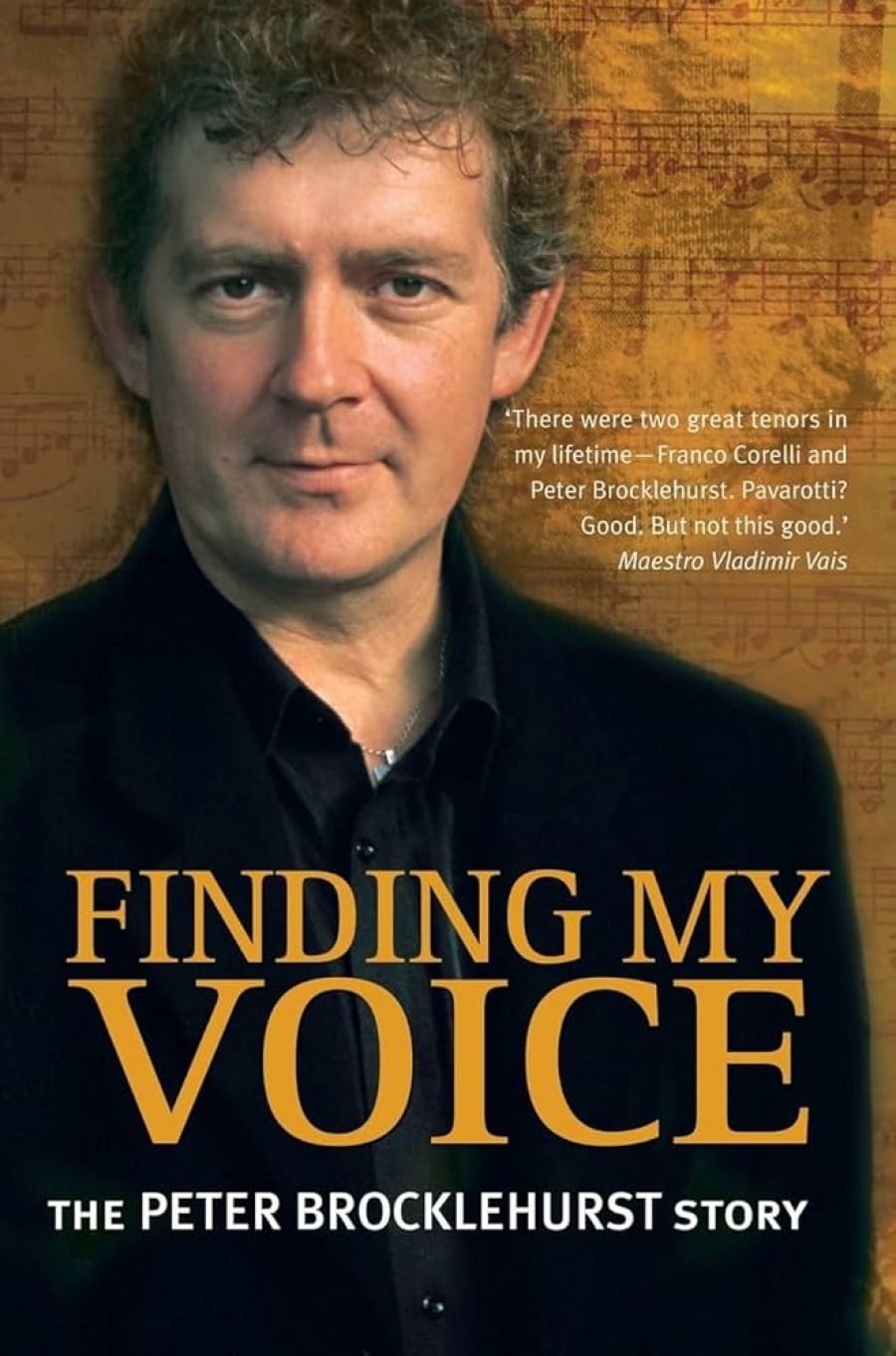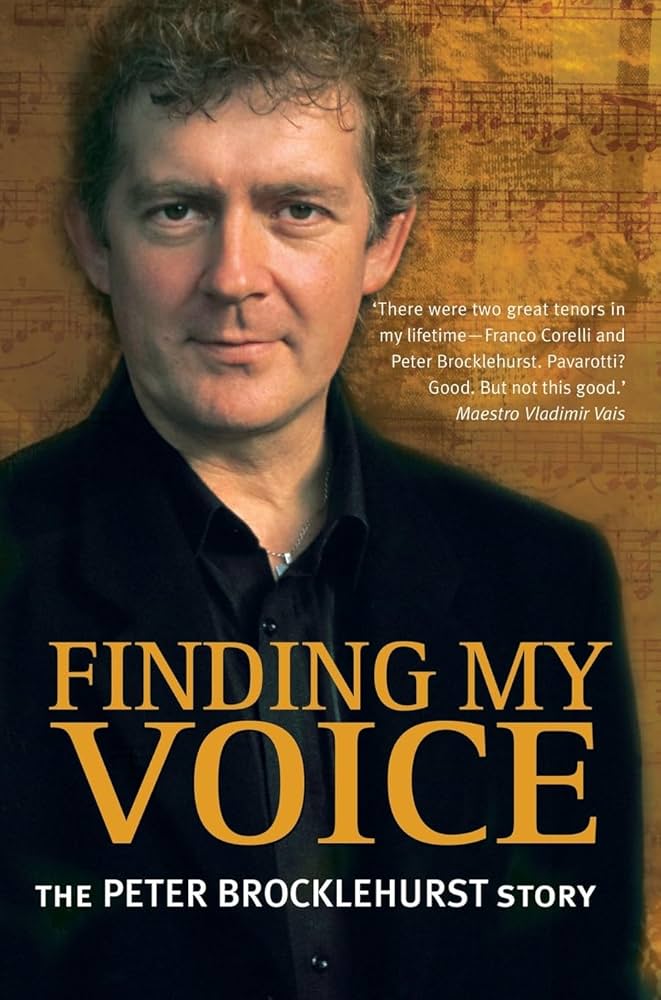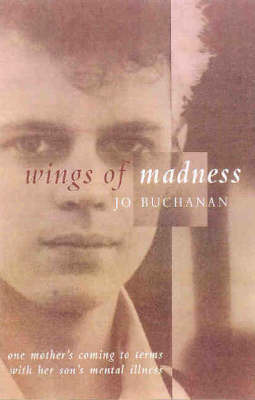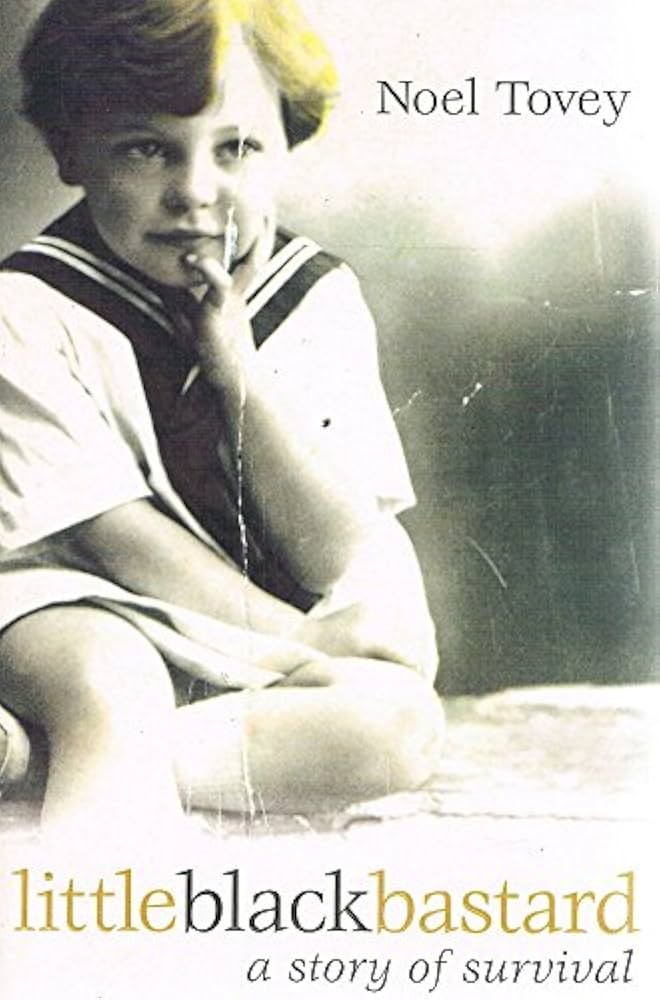
- Free Article: No
- Contents Category: Memoir
- Review Article: Yes
- Article Title: Live Performances
- Online Only: No
- Custom Highlight Text:
People often assume that actors and performers are extroverts, and that their work is a natural extension of an outgoing personality. But while, indeed, there are quite a few extroverts in the business, many who work in the performing arts are more likely to be introverts, for whom communicating with an audience is a form of expression that gives meaning to their lives.
- Book 1 Title: Finding My Voice
- Book 1 Subtitle: The Peter Brocklehurst story
- Book 1 Biblio: Allen & Unwin, $29.95pb. 231pp
- Book 1 Cover Small (400 x 600):

- Book 1 Cover (800 x 1200):

- Book 2 Title: Wings of Madness
- Book 2 Subtitle: A mother's journey
- Book 2 Biblio: New Holland, $24.95pb, 176pp
- Book 2 Cover Small (400 x 600):

- Book 2 Cover (800 x 1200):

- Book 3 Title: Little Black Bastard
- Book 3 Subtitle: A story of survival
- Book 3 Biblio: Hodder, $35pb, 248pp
- Book 3 Cover Small (400 x 600):

- Book 3 Cover (800 x 1200):

The publisher describes it as ‘an amazing story of survival, and a moving testimony to the power of the human spirit’. Clearly, with this genre, we are in need of happy endings.
Of course Wings of Madness is not in itself a theatrical memoir. It is concerned with mental illness, and Miles is only part of the story. Jo Buchanan’s sister Christine and her son Joel had both been diagnosed as suffering from schizophrenia. Joel eventually commits grisly suicide, laying his head on a railway track. Two months later, Christine dies of cancer. Under considerable stress as she copes with the family’s problems, Buchanan has her own dark moments, including an overdose of sleeping pills, which lands her in hospital. Later, the author unearths a family history of mental illness, and the research into this, in which she is assisted by Miles, ironically gives meaning to her own situation. On the one hand, she is appalled by the primitive treatment handed out to the unfortunate inmates of the Kew and Sunbury asylums in the early twentieth century, but, at the same time, the knowledge of this family history helps explain and somehow make more manageable Miles’s predicament.
Wings of Madness is an awkward narrative, at times confessional at other times little more than sketchy reportage with an occasional gesture to ‘good writing’. There is a lot of territory to cover in 170 pages. Buchanan herself is heading off in different directions, at one moment tutoring children employed in film and television, and then, within a sentence or two, running a practice in clinical hypnotherapy. There is a brief diversion into dolphin therapy in Hawaii, a holiday in Egypt that turns into a lost passport drama, and involvement in Mind-Body-Spirit festivals (whatever they may be).
A useful appendix on mental health resources is attached. Wings of Madness may be ‘a mother’s journey’, but Miles’s celebrity as an actor is crucial to the story, and most of the photographs are of him. Although he is given ‘The Last Word’, a brief coda on the need for faith, one cannot help wondering what he makes of the book.
The back-cover blurb on Finding My Voice assures us that ‘Peter Brocklehurst is a star’, but in fact the book is itself part of a publicity campaign designed to achieve that result. Brocklehurst is already being described as ‘the Aussie battler who was working as a cobbler in a shoe-repair shop in Hawthorn’ and ‘has burst on to the music scene and catapulted to fame’ (Stonnington Leader, 20 September 2004). While the accolade of ‘Aussie battler’ may seem a convenient cliche, there is an interesting story to be told here.
Peter was five when his parents – ‘ten-pound Poms’ – brought their young family to Australia in 1965. Eventually one of eight children, he ‘grew up in the back of a station wagon’, for the family always seemed to be on the move, often living in caravan parks. The reason for this is never fully explained and, although Brocklehurst stresses the loving care of his parents, the itinerant life often involved hardship and crises of one kind or another. He had his worst experience at the age of seven when he and his younger sister were abducted by a paedophile who sexually abused them and kept them locked in his car for several days. Perhaps remarkably, their captor at last let them go. Brocklehurst depicts himself as a shy and vulnerable child, picked upon and bullied by other children. Even the playful threat uttered by his elder brother, ‘Do you want to muck around?’, would make his heart sink.
The music in his life begins with a scratchy 78 recording of Mario Lanza singing the Serenade from The Student Prince. Young Peter was transfixed. But in the midst of a knockabout career in a variety of jobs, culminating in the comparative stability of the shoe repair shop in suburban Hawthorn, it is rock ‘n’ roll that claims Brocklehurst. For some years he works as a lead singer with country-town groups. It is a gruelling life, with a lot of travel, several broken relationships, three daughters along the way, an operation for nodules on the throat, an emotional collapse or two, and even a brush with suicide. Mario Lanza represents an unattainable ideal until, one day, the fairy tale unfolds. Having given up on an opera course at the Victorian College of the Arts, Brocklehurst is heard singing in his Hawthorn shop by a stranger who introduces him to Nick Columb, businessman and owner of racehorses, and voila, with a bit of help from that well-known music lover Alan Jones and the ABC’s Australian Story, the career is launched.
Some very exaggerated claims have been made for Brocklehurst as a tenor, Maestro Vladimir Vais ranking him with Franco Corelli as one of the two great tenors of his lifetime. Even if Vais is only referring to the raw material of the voice, such lavish praise is not helpful. Columb speaks loosely of Brocklehurst conquering La Scala, Covent Garden and Carnegie Hall, but it seems that the more realistic strategy of the campaign is to aim at the middle-brow market – Mario Lanza territory, in fact. Well, good luck to him.
Noel Tovey’s Little Black Bastard begins beguilingly with a ride on the 57 West Maribyrnong tram, revisiting the haunts of his Melbourne childhood and youth.
But this nostalgic trip hardly prepares us for the full grimness of the story that it introduces. His father was a street singer, descended from a black American vaudeville artist, his mother (known as ‘Mumma’) had an Aboriginal grandmother. Both had been cast adrift from their families and had hard lives; they were often drunk and were described in official documents as being ‘of bad character’. In 1941 both parents seem to go missing, and Noel and his elder sister Bev are sent off to the Welfare Depot as neglected children. Later, they are adopted by a man describing himself as a friend of their father; they go to live with this Arthur Challenger and his mother in country New South Wales. While their new ‘grandmother’ is kind and caring, both children suffer sexual abuse at the hands of Challenger over a period of years. The only glimmer of happiness during this time is when Noel is sent to the Far West Home in Manly, where he spends some months being treated for a knee injury. Challenger, however, who already had a shady reputation in the local community, is eventually found out and charged with carnal knowledge of a girl under sixteen. Noel and Bev are returned to the care of their mother in Melbourne, where he becomes something of a street kid. Throughout this childhood, he is sensitive to the taunts of being ‘an Abo’.
Yet as he grows up, tall and good looking – his ‘dark, animal-like demeanour’ giving him an exotic edge – Tovey survives through a variety of jobs and manages to infiltrate a bohemia on the fringe of theatre where be soon feels at home. With some help from older gay men who take him up, Tovey throws himself into ice skating and ballet and, via the chorus, breaks into the musical theatre that dominated the postwar years. One of the pleasures of little Black Bastard is the way it evokes the cultural atmosphere of Melbourne in the 1950s: the coffee lounges (Raffles, Cinders and, later, Val’s and Cafe Mirka); the raffish glamour of the Hotel Australia; ‘camp’ parties sometimes raided by ‘lily law’; National Service; the mischievous, sometimes manic, Mary Hardy, who was beginning to make her presence felt; and, would you believe, Germaine Greer in an unlikely play reading of Tea and Sympathy.
In 1960 Tovey heads for England, and the rest of the book is in the way of a coda: the successful career, the death of his partner from AIDS, the return to Australia in the 1990s, the revisiting of his childhood. Although he involves himself in the Aboriginal community, using his skills as a theatre director, there is still a certain ambivalence towards his indigenous background. ‘Now that I am seventy there is no need for me to know the complete history of my Aboriginality,’ he writes. ‘Curiosity is for the young.’
As a piece of storytelling, this is the best of these three memoirs – a distinctive voice, honest enough to engage the reader, its occasional bitchiness in itself reassuring.


Comments powered by CComment